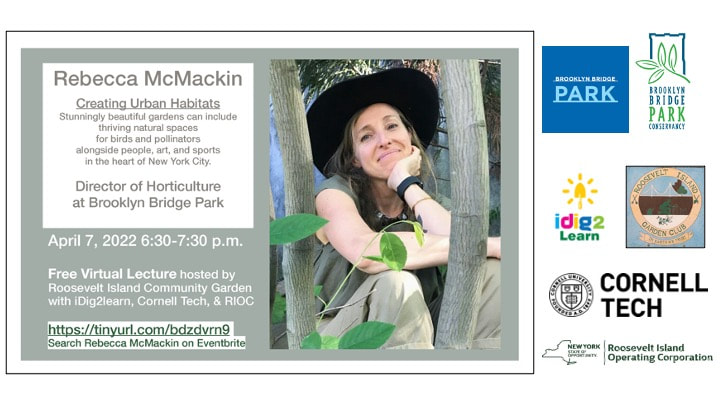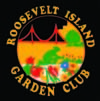Thanks again to the iDig2Learn, Cornell Tech, and the RIOC Office of Community and Community Affairs for teaming up with Roosevelt Island Community Garden to host this lecture.
Click below to hear the recording available until June 15th, 2022:
Rebecca McMackin from Brooklyn Bridge Park: A case study for seeing Roosevelt Island as an ecosystem - 04/07/22
Takeaways:
- Check your ecoregion to learn what plants work where you are. We can consider our cities as a "disturbance regime." Learn about all that can grow with ecological horticulture that takes into account all the life cycles happening around us and supports them.
- 83% of North Americans live in cities so creating space for the natural world within is vital. We can begin by accepting a nature inspired aesthetic and not using pesticides that harm pollinators in public areas.
- Brooklyn Bridge Park comprises several piers and surrounding areas, the largest park since 1860 when Prospect Park was created.
- BBP has created salt marsh, fresh water, wet and dry meadows areas alongside dense hedge rows and more traditionally landscaped park plants for entrance areas. All were created with engineered soils of a variety of percentage mixes of sand, silt and clay plus compost.
- Leave the leaves - caterpillars and other vital larvae for the beautiful pollinators who are overwintering there. Think of leaves as a slow motion carbon fountain dropping from the trees to the grounds decomposing and feeding the roots for uptake back within the tree. Certain birds like the Ovenbird and Swamp sparrows also need plant litter or duff to forage through. Leaves like Oak and Magnolia which are slow to decompose can be tucked out of sight for longer time periods. If you need a neat appearance for the public, consider a neat edge with areas under shrubs or just out of view left for natural systems.
- Wait to cut back your gardens, many pollinators nest in hollow stems, some birds remove stem fibers from plants like the Milkweed to build nests. Heather Holm suggests 18" of stem which also acts to stabilize the new growth. When BBP left the stalks of the Rose mallow, birds actually nested at the base - your actions give life. Try building up biology to keep pests in check. In her own garden she makes "bird bouquets" by cutting but sticking the stalks with dried seed heads for birds in the soil around the plant.
- Smooth aster and Heath aster host overwintering Pearl crescent butterflies so when clearing don't clear the base. Leave rotting logs for insects that need wood to survive in tucked away areas.
- Try using iNaturalist to add your sightings and to learn what is nearby. Both Brooklyn Bridge Park and Roosevelt Island have spotted the Golden Northern Bumble bee and the Blueberry Digger bee. Plus the two spotted lady beetles have returned to BBP.
- We are so used to thinking of cities as ecologically destitute and it is just not true. Cities are just very different and can even be refuges for certain species.
- Manage beds to foster biodiversity and wildlife habitat. Remember plants will continue to evolve and be healthier thanks to the pollinators who in essence have designed them.
- Learning about all the dynamics between and among organisms makes flowers and plants and life so much more beautiful!
Some of the Links shared during the talk:
Brooklyn Bridge Park Horticulture
RebeccaMcmackin website and newsletter
Brooklyn Bridge Park Environmental Education Center
NYC Pollinators Working Group
NYC Pollinators Working Group Resources
The Lenape Center
Engaged Roosevelt Island

 RSS Feed
RSS Feed
